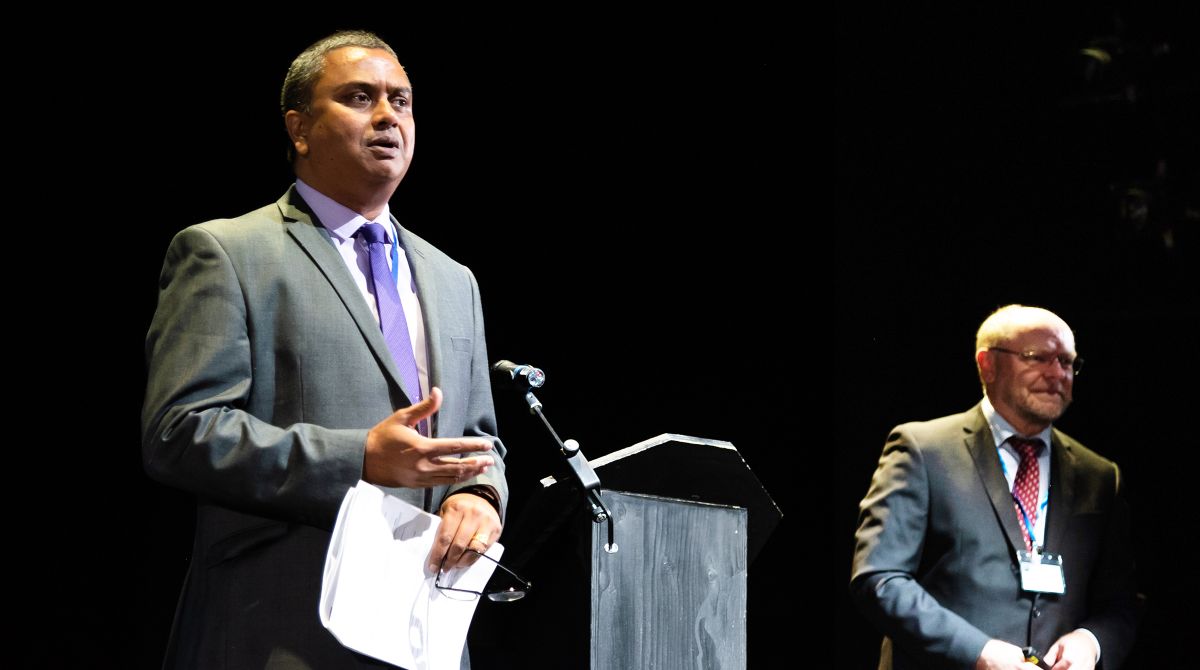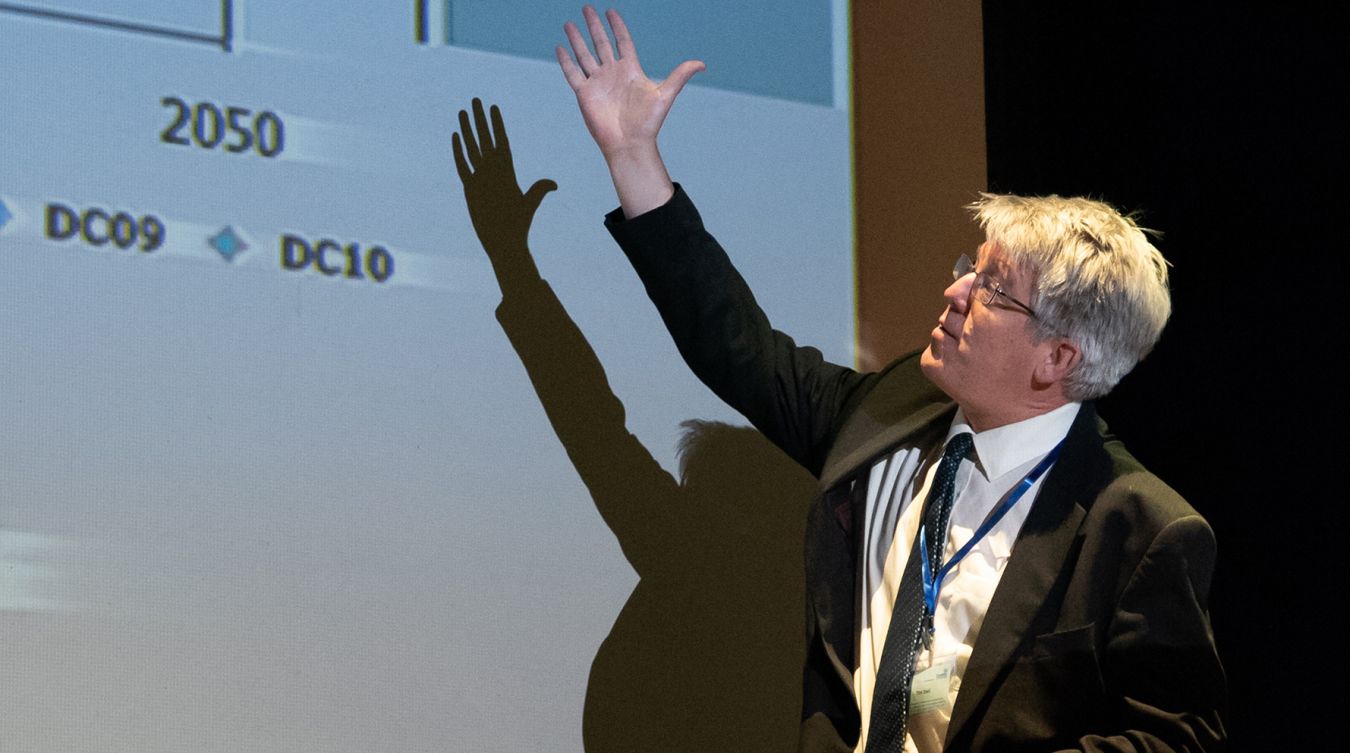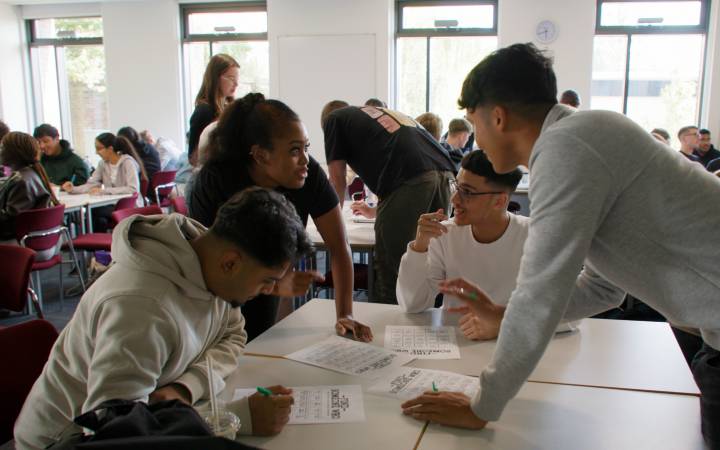A sustainable future for construction – Kingston University hosts international conference to help tackle climate crisis
Posted Tuesday 23 July 2019
 Kingston University's Professor Mukesh Limbachiya and Professor Christian Grosse, from the Technical University of Munich, speaking to delegates during the international sustainable construction materials and technologies conference hosted by Kingston University.
Kingston University's Professor Mukesh Limbachiya and Professor Christian Grosse, from the Technical University of Munich, speaking to delegates during the international sustainable construction materials and technologies conference hosted by Kingston University.
How does the construction industry reduce its global carbon footprint to help create a more sustainable future for the planet? Experts from around the world gathered at Kingston University for an international conference to discuss the challenges and potential solutions that could play a key role in helping tackle the climate crisis.
With the UK government recently making a commitment to reach net zero carbon emissions by 2050, finding innovative ways to reduce waste and make construction more efficient was vital, according to Kingston University's Professor Mukesh Limbachiya, conference organiser.
"Sustainability is the biggest challenge facing humanity today," he said. "It is particularly relevant for the construction industry as around half of the world's carbon emissions come from the built environment and construction-related activities. Research has shown that making even one or two per cent difference could have a hugely beneficial impact on achieving the goals of lowering carbon emissions by 2050."
The fifth International Conference on Sustainable Construction Materials and Technologies, held at Kingston University's Penrhyn Road campus in partnership with Coventry University, brought together 160 researchers, practising engineers and professionals from 38 countries, with some 140 peer-reviewed papers presented. Alongside the University campus, sessions were also held at three other venues within Kingston - the borough's Rose Theatre, the Guildhall and Ravens Ait Island on the River Thames.
Among the topics discussed were the efficient and sustainable use of construction materials, technological advances for sustainable practice, designing structures and building for sustainability, as well as the regulatory framework and government initiatives.
Bringing together world-renowned experts to share their ideas and views was key to finding new ways forward, Professor Limbachiya, from the University's Faculty of Science, Engineering and Computing, said. "What we want people to take away from this conference is the importance of thinking outside the box in the construction industry, as well as developing an increased awareness of some of the innovations taking place around the world. As a result, we hope new practices can be adopted that could make a real tangible difference to lowering the carbon footprint and increasing the recycling and reuse of materials."
Among the academics attending was Professor of Structural Engineering Tim Ibell, from the University of Bath, who gave a keynote address at the conference. He outlined the need for using materials more efficiently as well as looking at how to create more efficient structures by rethinking the assumed loads of buildings.
"Sustainable construction is paramount for the planet," Professor Ibell said. "Embodied carbon in buildings makes up around 20 per cent of all the planet's carbon emissions so if we save just a few per cent, that's the equivalent of wiping out the entire aviation industry's contribution to carbon emissions. That's the enormity of what we've got in front of us so we have to save materials at every cost.
"We need to put materials only where we need them- if you look around, almost all buildings are rectangular in shape and size, but in fact the stresses vary everywhere so why not have curvy elements? That could save an enormous amount and is a key part of my research in this area."
Another keynote speaker was Professor Christian Grosse, from the Technical University of Munich, who outlined the role of data in tackling the issue, highlighting how being able to determine the remaining use of life for a construction can help lead to more efficient uses of energy sources and materials.
The importance of taking a global view to waste management was also key, according to Professor of Materials Resources Engineering Chris Cheeseman, from Imperial College London. "We urgently need to move to a circular economy, because the materials we use have huge amounts of embodied energy in them," he said. "The knock on effects of poor waste management are global issues such as plastics in the ocean. At the moment we have two billion people on the planet who don't have access to an effective waste management system.
"Waste management in developing countries is a huge challenge that we need to address. If there's no waste collection, it will end up in waterways, from where it goes in to the sea. It is a key global issue and that's where international initiatives need to be focused to have real impact."
The sustainable construction materials and technologies conference at Kingston University was the fifth in a series that was first held at Coventry University in 2007. It was followed up with events at the Marche Polytechnic University in Ancona, Italy in 2010, the Kyoto Research Park in association with the University of Kyoto, Japan in 2013, and most recently in 2016 at the University of Nevada in Las Vegas, United States.
- Find out more about undergraduate and postgraduate courses in the Faculty of Science, Engineering and Computing.
 Professor Tim Ibell, from the University of Bath, was one of the keynote speakers at the sustainable construction materials and technologies conference at Kingston University.
Professor Tim Ibell, from the University of Bath, was one of the keynote speakers at the sustainable construction materials and technologies conference at Kingston University.Contact us
General enquiries:
Journalists only:
- Communications team
Tel: +44 (0)20 8417 3034
Email us



